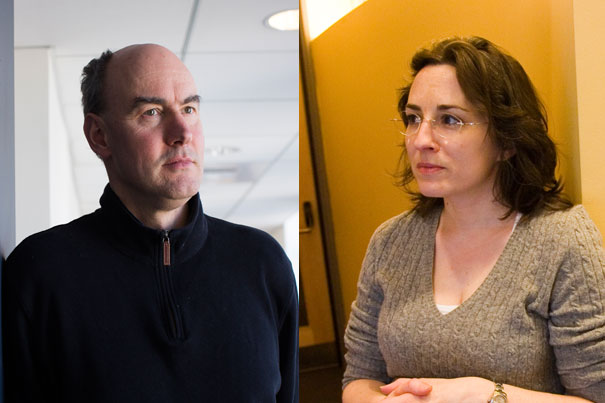
2016 Fannie Cox Prize recipients Martin Nowak and Elena Kramer were chosen for their “ability to teach challenging concepts with clarity and inspire undergraduates to pursue careers in the sciences,” said Edgerley Family Dean of the Faculty of Arts and Sciences Michael D. Smith.
File photos by Stephanie Mitchell/Harvard Staff Photographer
‘Innovative’ teaching is recognized
Kramer, Nowak receive Fannie Cox Prize for Excellence in Science Teaching
Elena Kramer, chair of the Department of Organismic and Evolutionary Biology and the Bussey Professor of Organismic and Evolutionary Biology, and Martin Nowak, professor of mathematics and biology and director of the Program for Evolutionary Dynamics, have been named the 2016 recipients of the Fannie Cox Prize for Excellence in Science Teaching.
Made possible by a generous gift from Gardner Hendrie ’54 and consisting of a $10,000 personal award and $40,000 in unrestricted support for teaching and research, the Fannie Cox Prize recognizes exceptional teaching in introductory science courses. A committee comprised of faculty members from across the sciences, including previous awardees, recommends recipients based on their ability to inspire students, instill in them a passion for science, and effectively communicate complex ideas. The winners are selected by Jeremy Bloxham, dean of science and professor of geophysics and computational science.
“Elena Kramer and Martin Nowak inspire their students with their enthusiasm and creative teaching methods, and their ability to teach challenging concepts with clarity and inspire undergraduates to pursue careers in the sciences,” said Edgerley Family Dean of the Faculty of Arts and Sciences Michael D. Smith, the John H. Finley Jr. Professor of Engineering and Applied Sciences. “They are wonderful examples of the innovative teaching that happens every day in Harvard’s classrooms. I hope everyone will join me in recognizing Elena and Martin for exciting a passion for scientific inquiry in our students.”
“It’s a great privilege to teach Harvard students,” Nowak said. “I like to discuss the foundations of my field with them and lead them from there to research questions. The students have a fresh approach, which often enables them to see new connections. I am excited about their ideas, about their work.
“Over the last 10 years the Program for Evolutionary Dynamics has engaged more than 100 undergraduate students in research projects,” he continued. “Some of those students gave their first scientific talk about their own work and became co-authors of publications. My goal is to communicate the joy of doing scientific research.”
“It was a really lovely surprise [to receive this award],” Kramer said. “I was particularly honored because I was nominated by students and TAs. This is a terrific program and I deeply appreciate the generosity of Gardner and Karen Hendrie, who understand the importance of emphasizing our commitment to undergraduate education in science.
“I have to say that in most of my courses, I work closely with co-instructors, especially Missy Holbrook in OEB 52, so I feel like I have to share this honor with them,” she added. “In addition, we have been making more and more use of the Bok Center, particularly the Media Fellows program, to bring more creative aspects into our science courses, which has really enriched these experiences. I haven’t decided what I will do with the extra support. One day I would like to work with Professor Holbrook to develop a Gen Ed course on modern agriculture, but that will have to wait until I’m done with this tour of duty as chair.”




